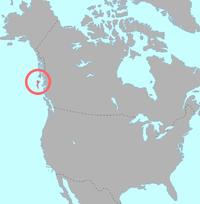Haida (language)
Haida is an indigenous language of North America spoken by around 50 to 60 people on the Canadian Haida Gwaii Islands, British Columbia , and in neighboring southern Alaska ( Prince of Wales Island , Hydaburg, and Ketchikan ). All competent speakers are older than 60 years, the Haida people include over 2,000 people. The name Haida comes from xayda , which means "person" or "human being" in the Haida language. The previously assumed genetic relationship between Haida and the Na Dené languages is now largely rejected, so Haida must be viewed as an isolated language .
Dialects, settlement areas and number of speakers
Research into the Haida language began in the mid-19th century, and substantial work (dictionaries and grammars) has been in progress since the 1970s. Haida has four dialects, which are divided into a northern and a southern group:
-
Haida
-
South Haida
- Ninstints †
- Ski gate
-
North Haida
- Masset
- Kaigani
-
South Haida
Some researchers see North Haida and South Haida as two different languages, the difference between them being about as great as that between German and Dutch (Campbell 1997). The southernmost dialect Ninstints was spoken earlier on Anthony Island , it still had a few speakers at the beginning of the 20th century, but became extinct in 1970 (Krauss 1973). The Skidegate dialect on the central Haida-Gwaii Islands is still spoken by 10 people, the Masset dialect on the northern Queen Charlotte Islands by around 30. In the early 18th century, a Haida group moved to southern Alaska. Of the descendants of these migrants, 15 speak the so-called Kaigani dialect in the towns of Hydaburg and Ketchikan (spokesman figures according to Krauss 1997). All competent speakers of the Haida are at least 60 years old, so the Haida language is endangered in its existence and will be extinct in a few decades.
Relationship with Tlingit, Eyak and Athapaskan
A genetic language relationship between Haida, Tlingit , Eyak and the Athapaskan languages has been postulated since the middle of the 19th century . This language group was established by Edward Sapir in 1915 as Na Dené languages , and Joseph Greenberg adopted it in 1987 in his work Language in the Americas . In more recent works on the Haida, however, its membership of the Na Dené group is very much questioned. According to the researchers, the similarities are based more on areal language contacts (Tlingit is spoken directly north of Haida) and on incorrect language analyzes from early comparative research (Levine 1979, Leer 1990, 1991, Campbell 1997, Mithun 1999). Based on these findings, Haida should be regarded as an isolated language and not as a Na-Dené language for the time being.
literature
Description of Haida
- John Enrico: Haida Syntax. 2 volumes. University of Nebraska Press, Lincoln NE et al. 2003, ISBN 0-8032-1822-2 .
- John Enrico: Haida Dictionary. Skidegate, Masset, and Alaskan Dialects. 2 volumes. Alaska Native Language Center et al., Fairbanks AK et al. 2005, ISBN 1-555-00087-8 .
American languages
- Joseph H. Greenberg : Language in the Americas. Stanford University Press, Stanford CA 1987, ISBN 0-8047-1315-4 .
- Lyle Campbell : American Indian Languages. The Historical Linguistics of Native America (= Oxford Studies in Anthropological Linguistics. 4). Oxford University Press, New York NY et al. 1997, ISBN 0-19-509427-1 .
- Michael Krauss: The Indigenous Languages of the North: a Report on their Present State. In: Hiroshi Shōji, Juha Janhunen (eds.): Northern Minority Languages. Problems of Survival (= Senri Ethnological Studies. 44, ISSN 0387-6004 ). National Museum of Ethnology, Suita et al. 1997, pp. 1-34.
- Marianne Mithun: The Languages of Native North America. Cambridge University Press, Cambridge et al. 1999, ISBN 0-521-23228-7 .
Haida and Na-Dené
- Michael Krauss: Na-Dene. In: Thomas A. Sebeok (Ed.): Current Trends in Linguistics. Volume 10: William Bright (Ed.): Linguistics in North America. Part 2. Mouton, Den Haag et al. 1973, ZDB -ID 421588-6 , pp. 903-978.
- Robert Levine: Haida and Na-dene: a New Look at the Evidence. In: International Journal of American Linguistics. Vol. 45, No. 2, 1979, ZDB -ID 199170-x , pp. 157-170.
- Jeff Leer: Tlingit: a Portmanteau Language Family? In: Philip Baldi (Ed.): Linguistic change and reconstruction methodology (= Trends in Linguistics. Studies and Monographs. 45). Mouton de Gruyter, Berlin et al. 1990, ISBN 3-11-011908-0 , pp. 73-98.
- Jeff Leer: Evidence for a Northern Northwest Coast Language Area. In: International Journal of American Linguistics. Vol. 57, No. 2, 1991, pp. 158-193.
- John Enrico: Toward Proto - Na-Dene. In: Anthropological Linguistics. Vol. 46, No. 3, 2004, ISSN 0003-5483 , pp. 229-302.
Web links
- Ernst Kausen, Classification of Indigenous North American Languages. (DOC; 138 kB)
- North and Mesoamerican languages
- Martin Krueger: Indian languages. Archived from the original on December 17, 2014 ; accessed on March 18, 2015 .
- Ethnologue: Languages of the World English
